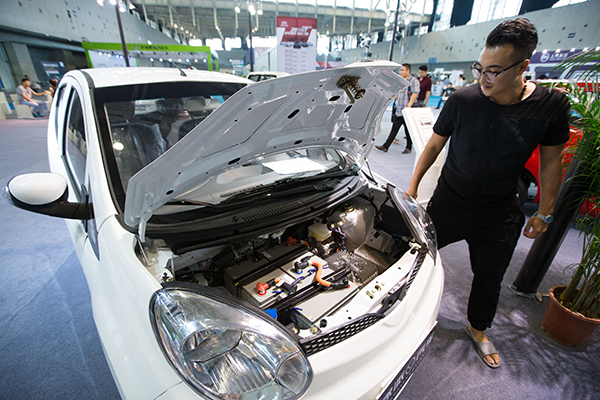 |
|
A visitor examines a new energy car at an auto exhibition in Nanjing, Jiangsu province, in early September. [Photo/China Daily] |
China is considering introducing a dual-credit scheme for gasoline cars' fuel consumption and new energy vehicle production. Experts believe that this will help to boost the new energy sector's development now that the government is gradually cutting subsidies.
The Ministry of Industry and Information Technology released the information on Thursday to seek public opinion. According to the scheme, automakers in China will be assessed against the country's fuel consumption demands. Meanwhile, those who produce more than 50,000 cars a year will be examined in terms of new energy vehicle production. Those who fail to meet the goals will have to buy credits from other automakers or be fined.
New energy vehicles include pure electric cars, plug-in hybrids and fuel cell models, but they do not include hybrids such as the Nissan Leaf.
The dual-credit proposal is sound, as it will help to meet the goal of cutting average fuel consumption to 5 liters per 100 kilometers and also to encourage the development of the new energy sector, wrote Cui Dongshu, secretary-general of the China Passenger Car Association, in his blog.
"The scheme has outlined fixed percentage points of credits automakers must earn from 2018 by producing new energy cars, and such credits can be used to enhance their gasoline fuel consumption efforts, so they have a clear goal at the very start."
According to the proposed scheme, new energy vehicles' credits should account for 8 percent of an automaker's total in 2018, 10 percent in 2019 and 12 percent in 2020, with one new energy vehicle calculated as two to five units depending on their mileage on one charge.
It would encourage automakers to extend the mileage of their products and thus make them attractive to those potential customers who suffer mileage anxiety, Zhao Yongchang, an energy-saving expert at the China Automotive Technology & Research Center, told China Automotive News.
Cui said the proposal will also change the landscape as Chinese automakers focus on new energy vehicles while international ones are more interested in cutting fuel consumption.
"It is essential that the joint ventures with international automakers develop new-energy vehicles as they will enable China to catch up technologically."
The scheme came after a similar credit system proposed by the National Development and Reform Commission in early August.
The commission's system is based on carbon emissions, with the credits calculated according to the amount of reduced carbon dioxide emissions from the use of new energy vehicles manufactured in or imported into the country.
There is not official information available about whether the two proposals relate to the same plan or how the two would coordinate implementation when they become legislation.
